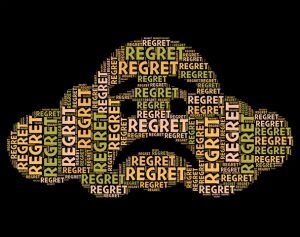How to make regrets work for you instead of against you
I am reading a book called Living Your Unlived Life by Robert A. Johnson, and it has got me thinking about all the things I wanted to do with my life. That and a big birthday next year have made me reflect on what I wish I’d done differently. Overall, I think my life has turned out pretty well, but I sometimes think about those paths I didn’t take.
 Edith Piaf and Robbie Williams may have sung about having no regrets, but realistically, everybody has some regrets. There is a biological reason for all our emotions, and regrets are no different. Even though they can cause sorrow, regrets can be a positive force if you use them to learn to make better decisions.
Edith Piaf and Robbie Williams may have sung about having no regrets, but realistically, everybody has some regrets. There is a biological reason for all our emotions, and regrets are no different. Even though they can cause sorrow, regrets can be a positive force if you use them to learn to make better decisions.
What are the biggest regrets people have?
 There is a common theme to the regrets women (and men) have when they get to their 50s.
There is a common theme to the regrets women (and men) have when they get to their 50s.
-
- Health – not looking after yourself
- Money – not saving enough or spending wisely
- Romance – staying with the wrong person
- Travel – not seeing enough of the world
- Friends – not keeping in touch with people
Research has shown that you regret things you have done in the short term, but in the long term, you regret actions you didn’t take the most. Mainly, these relate to missed opportunities, not taking risks or being bold enough. Ironically, the more opportunities you have, the more likely you will have regrets. The older you get, the more regrets focus on living a more authentic life, making a difference and having a sense of purpose.
Have you taken the Quiz yet?
If you are curious to find your Wise Woman Archetype, take my fun quiz and find out here.
The psychology of regret
In his book The Power of Regrets, Daniel Pinks lists four types of regret
-
- Foundation – if only I had studied harder/been healthier/saved more. Regrets that have a long-term negative effect.
- Boldness- taking chances. Regrets from being too cautious and not taking risks.
- Moral – guilt about people you have hurt.
- Connection – Lost relationships such as friends you didn’t keep in touch with.
What is regret?
 A regret is a negative emotion related to an action that would have worked out better if you had done it differently. It could be that you have done something you regret or not done something, but whatever it was, it was the wrong thing. Regrets can lead to feelings of guilt and self-blame.
A regret is a negative emotion related to an action that would have worked out better if you had done it differently. It could be that you have done something you regret or not done something, but whatever it was, it was the wrong thing. Regrets can lead to feelings of guilt and self-blame.
Dwelling on regrets is a bad thing. It can be all-consuming and lead to depression and unhappiness. Constantly thinking about what you should or shouldn’t have done is exhausting and doesn’t get you anywhere. Bemoaning something where you had no control is futile. There is no point worrying about things you cannot change. Equally, you shouldn’t try to ignore negative emotions as they don’t go away. Instead, they tend to fester in your mind, ready to surface at an inconvenient time. But if you use your regrets instead to make better decisions next time and do better in the future.
Regrets can help you learn about yourself. It shows you that you have a choice and that those choices have consequences. Thinking about what you did wrong can hopefully prevent you from repeating the same mistakes. It also shows others that you have learnt from your experience and can be trusted to do better.

Me with a monkey on my head
What can you do about it?
-
- Don’t dwell on it, but allow yourself to experience the emotion and process the feeling.
- Don’t bottle up your feelings. If you don’t want to talk to someone, write it down.
- Accept things don’t always work out as you want them to.
- Things may not have worked out better if you had done something different.
- Reflect on your regret (see Daniel Pink’s four types above).
- Take note of how you tend to react – sad, angry, frustrated, blaming yourself or others, anxiety or fixation.
- Keep it in perspective. How much has it really affected your life?
- Practice self-compassion – we all make mistakes.
- Learn from past regrets. Try not to repeat your mistakes.
- Before making a significant decision, think about the worst thing that could happen.
One of my biggest regrets is not travelling much when I was younger. I sometimes wonder how wonderful it could have been to live somewhere like Berlin in the 1980s. But when I look back on what I did do. I left home at 17, lived with friends and had two amazing cats. I didn’t want to live in another country then. I have lived in several interesting places in the UK, though. Chesterfield, my home town, Scarborough, Belfast and Bristol. As well as summer breaks working in Gurnsey, Israel and Turkey.
You May Also Like
Move Over Dr Who....
Regeneration is for women in midlife too.
Six things NOT to do...
when you are having a midlife crisis
Things you should do in midlife
How to love midlife.


